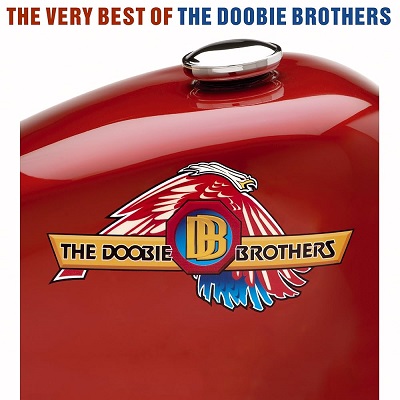“What Doobie you be?” If you’re like me — a child of the 70s — you might recall this question being asked by Rog’s younger sister, Dee on the popular sitcom, What’s Happening. On one episode of the show the Doobie Brothers actually appeared and played, prompting Dee to ask this question and draw a hearty laugh from the audience. And though I’m sure little Dee didn’t really know it, that’s about the best question you could ask a band with more personnel changes than most. Yeah, listening to the The Best Of The Doobie Brothers brings those kind of memories back. Hey hey hey!
Releasing their self-titled debut album in 1971, Tom Johnston and Patrick Simmons helmed the early DB’s with their mix of songwriting and impressive vocal harmonies. On the double disc compilation, there is only one song from the first album — a sorry omission, but understandable when you consider all of the band’s greatest hits. With the release of their second album, 1972’s Toulouse Street, the brothers hit their stride — “Listen to the Music,” “Jesus is Just Alright,” and “Rockin’ Down the Highway” all garnered heavy airplay and paved the way for the band’s ascent. It’s interesting to note extensive personnel shuffling was already underway when they released Toulouse Street: they added a second drummer and replaced original bass player, Dave Shogren.
As will always be the case for me, I’m more interested in the songs that weren’t the big hits. For example, the first disc includes Simmons’ “South City Midnight Lady,” an obscure song from the DB’s third album, 1973’s The Captain and Me. That number is a definite standout as is the horn-punchy “Eyes of Silver” from What Were Once Vices Are Now Habits, the Doobie’s fourth album. Of course, numbers like “Black Water,” “Take Me In Your Arms (Rock Me),” “Takin’ It To The Streets,” and “It Keeps You” Runnin” were huge hits for the Doobies and they are all included here. “Takin’ It” and “Running” were sung and written by then new Doobie, Michael McDonald. This represented a new direction for the brothers with the songwriting and soulful vocals of McDonald who joined in 1975. I must compliment the powers that be for the inclusion of three songs from the Stampede album, especially “I Cheat The Hangman,” which features a great instrumental coda and was actually played on What’s Happening. This fifth Doobies album from 1975 saw Jeff “I-am-now-working-in-politics” Baxter joining the band to add his blistering guitar work.
The second CD of The Best Of The Doobie Brothers opens with two songs from 1977’s Livin’ On The Fault Line — a cover of Marvin Gaye’s “Little Darling (I Need You)” and “Echoes Of Love.” Both are treated with the competent Doobie harmonies and that soft jazz sound the band employed during this period. While “Echoes” is pure Doobie Brothers, “Little Darling” could have been easily included on a McDonald solo album, so strong was his influence at this point in the band’s career. In fact, what comes across as we get deeper into the mid-to-late 70s portion of the group’s output is what a strong musical force McDonald truly was (and still is). He sang lead on almost all of the hits, and if he isn’t the sole writer of the songs, he’s at least a co-writer of most on what is arguably the band’s most popular album, 1978’s Minute By Minute.
The liner notes on this compilation boast that Minute By Minute found the band at “the peak of its powers.” Certainly, this Grammy award-winning release — four Grammys, in fact — did see the stock rise. No one can argue that the title track, “What a Fool Believes,” and “Depending on You” (a great example of a Patrick Simmons and Michael McDonald collaboration) weren’t wickedly popular FM staples. What brought the band their fame at this point were polished, lovelorn vocals and less stand-out guitar work. Unfortunately, these were issues that eventually lead to more personal changes as Baxter and original drummer John Hartman exited the very next year. Nevertheless, the band moved forward with replacements and released One Step Closer in 1980. Three cuts from it made the grade and are included here.
There’s a nice inclusion of “Wynken, Blynken and Nod” from the 1980 all-star compilation, In Harmony: A Sesame Street Record. I always applaud these little nuggets on a greatest hits package. For those of us who might not have access to these kind of releases, it’s nice to get something like this thrown into the mix. In 1989, the Toulouse Street line-up reformed to release Cycles, and three of its tunes are included on the second disc of this collection — “The Doctor,” “South of the Border,” and “Need A Little Taste Of Love,” all grooving rockers with Johnston at the helm of the band once again. Other than “Doctor,” none of these tracks earned much radio play, but they aptly represent that pre-McDonald-era Doobie sound.
One of highlights of this entire collection is Simmons’ “Dangerous” from 1991’s Brotherhood. This one sounds like a band full of life again, with great guitar playing, horns, dynamics, everything we’ve come to expect from the Doobie Brothers throughout all their incarnations. “Ordinary Man,” the final song on the set, is from 2000’s Sibling Rivalry. It’s a fitting elegy to close this set out — a mellow rumination on the singer’s limitations and past mistakes, which says more about this truly American band than a majority of their big hit singles ever could.
The Best Of The Doobie Brothers is a full package spanning this very popular band’s career – 30 songs on two CDs! It is filled with a solid balance of hits (maybe one too many, but what can you do with a greatest hits package?) and some nice trinkets thrown in for the diehard Doobie dudes and dudettes out there. All in all, this makes for a very solid retrospective.
~ Ralph Greco, Jr.




















